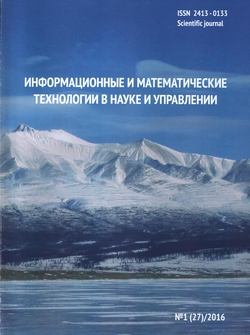Volume №1 / 2016
Articles in journal
The article discusses the approach to the development of intelligent systems of semantic type for situational strategic management of critical infrastructures (for example, energy infrastructure). The goal and main problems of the project are formulated. It’s described the proposed methods, the current state of research in this area, the expected results and the scientific background of the project (work done by the author leadership in this direction). An extensive bibliography is represented.
The report considers the possibility of using the methods of contingency management studies the energy security problems. Compares scheme Research Assessment Energy in terms of contingency management and the scheme of tasks, and used in this modeling techniques to assess the impact of threats on the state of energy security. The report gives the characteristics of the concept of "the situation", situational analysis and situational modeling. The report gives examples of simulated emergency situations in the energy system and the use of semantic modeling methods for the study of energy security threats.
In the article the questions of modeling of knowledge when building intelligent systems, in particular, the problem of describing situations in the tasks of situational management in the energy sector. Ontologies are used as the primary means of identifying and structuring the main concepts and relationships in the subject area, as well as a means of their formal representation in the development of intelligent systems.
The article proposes to extend the application of semiotics to cartography as part of integration trends "Neogeography" and "Metakartosemiotika." It is proposed to introduce the concept of the zero-sign to indicate "unsigned" method of transmitting information
The article is devoted to solving the problems of formation of the list of critical facilities gas pipeline network in Russia to meet the requirements of energy security. The approach highlights critical energy systems based on their impact on the overall performance of the system. This is done by analyzing the level of negative consequences for consumers of the termination or violation of a particular object. The analysis is carried out using a distributed computational environment-you, which is formed by means of software and computing complex "Oil and Gas in Russia" and tools DISCOMP, intended for organizationof multivariate numerical experiments in heterogeneous distributed computationalenforcement environments.
The article concerns the actual problem of the parallel programming paradigms. Importance of this topic comes from the steep increase in the number of new-generation programming languages oriented at application and development of modern information technologies.
Metaheuristics are widely recognized as efficient approaches for hard optimization problems. This paper addresses the application of metaheuristics for optimizing parameters of fuzzy classifiers. Several numerical experiments on well-known benchmark data sets are carried out to illustrate the effectiveness of the proposed metaheuristics
The algorithm of feature selection was proposed based on mine blast optimization. Two algorithms are described for a structure generation of fuzzy approximators. The first of them is dynamic partitioning of the input space and the second is piecewise linear initialization. An algorithm are described for structure generation of a fuzzy classifier based on the extreme values of observation table. The results of the algorithms benchmarked on real data from the repository KEEL
